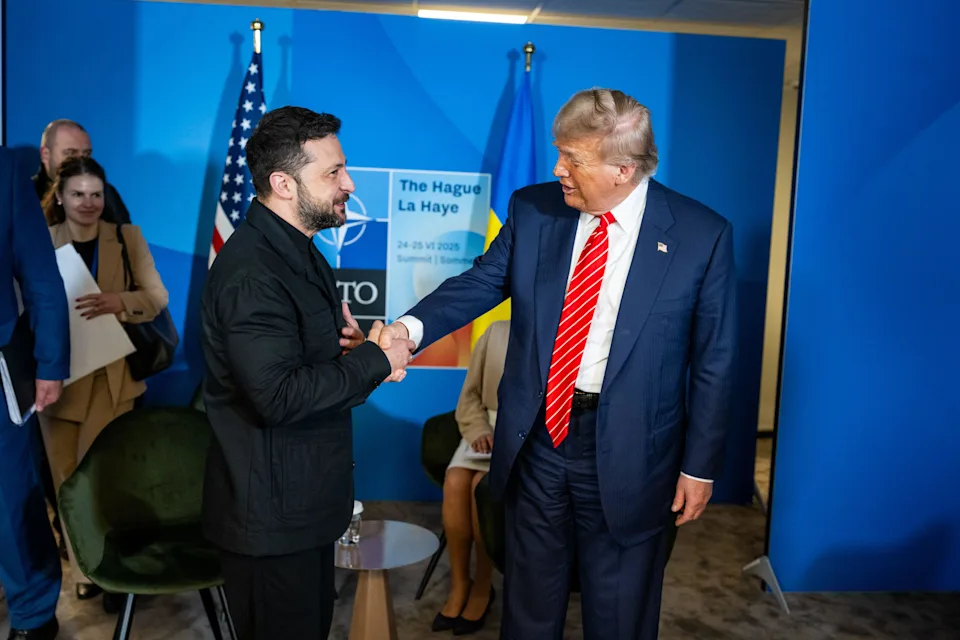Ukrainian President Volodymyr Zelenskyy announced he will travel to Washington on Monday for talks with Donald Trump following the U.S. president’s summit in Alaska, amid growing speculation that Washington may push Kyiv to concede territory in exchange for ending the war.
The upcoming visit will be Zelenskyy’s first return to the White House since his tense encounter in February with Trump and Vice President JD Vance in the Oval Office.
In a statement after a one-hour phone conversation with Trump, Zelenskyy confirmed the U.S. president had briefed him on his meeting with Vladimir Putin and shared “main points” of their discussion. Zelenskyy did not disclose details, but his communications chief later clarified that Kyiv had “no information” about reports suggesting a possible air ceasefire ahead of a three-way summit.

Trump, speaking to Fox News after his talks with Putin, confirmed that the idea of Ukraine ceding land was discussed—something Zelenskyy has consistently rejected. “We negotiated those points, and there’s broad agreement,” Trump said. “We’re close to a deal. Ukraine has to accept it—maybe they won’t.”
Trump later posted on Truth Social that he expects to meet Zelenskyy on Monday afternoon. If progress is made, he said, he would then aim to arrange direct talks with Putin, though Moscow has resisted face-to-face negotiations with the Ukrainian president.
The U.S. leader stressed that a “comprehensive peace agreement” would be preferable to a temporary ceasefire, which he argued often collapses. Still, with Russia and Ukraine far apart on their demands, the path to such a settlement remains uncertain.
Zelenskyy noted that after his call with Trump, European leaders joined the conversation for another half-hour, underscoring the need for “European involvement at every stage to guarantee lasting security alongside the U.S.” Those participating included UK Prime Minister Keir Starmer, French President Emmanuel Macron, German Chancellor Friedrich Merz, Italian Prime Minister Giorgia Meloni, Poland’s President Karol Nawrocki, Finland’s President Alexander Stubb, NATO Secretary General Mark Rutte, and European Commission President Ursula von der Leyen.
A follow-up call was later held between Zelenskyy and European leaders to compare notes on Trump’s debrief of the Putin meeting. Zelenskyy described “positive signals” from Washington regarding its willingness to play a role in Ukraine’s future security guarantees.
While the U.S. has previously been vague about how it might help prevent renewed Russian aggression, European officials suggested the discussion included NATO-style assurances for Ukraine. A joint statement from the European leaders welcomed Trump’s efforts, stressed that Ukraine “must receive unbreakable security guarantees,” and insisted that any territorial decisions remain solely Kyiv’s choice. They also warned of new sanctions against Russia if necessary.
Meloni highlighted renewed talks on Italy’s earlier proposal modeled on NATO’s Article 5, which obligates members to defend one another if attacked. Macron emphasized that “pressure on Russia must continue,” while praising U.S. willingness to commit to long-term guarantees. Starmer reiterated that peace negotiations cannot proceed without Zelenskyy’s direct involvement.
Meanwhile, the war on the ground showed no signs of easing. Ukrainian officials reported three civilians killed and 12 injured in Russian strikes on Kherson. In Donetsk, Ukraine’s Azov Brigade said it recaptured six villages from Russian sabotage units, killing 271 enemy soldiers and injuring more than 100. Ukraine’s air force reported shooting down 61 out of 85 drones and decoys launched overnight, while Russia claimed it seized two frontline villages as Kyiv confirmed the loss of another settlement near Pokrovsk.
The fighting marked the 1,270th day since Russia’s full-scale invasion began in February 2022.


